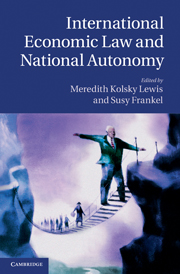Book contents
- Frontmatter
- Contents
- Notes on contributors
- Acknowledgements
- Introduction
- PART I International economic law: conceptions of convergence and divergence
- 1 The end of the globalization debate: continued
- 2 Global economic institutions and the autonomy of development policy: a pluralist approach
- 3 Fragmentation, openness and hegemony: adjudication and the WTO
- PART II WTO treaty interpretation: implications and consequences
- PART III Responding to international economic law commitments
- PART IV Transformations in international economic law
- Index
- References
3 - Fragmentation, openness and hegemony: adjudication and the WTO
from PART I - International economic law: conceptions of convergence and divergence
Published online by Cambridge University Press: 10 January 2011
- Frontmatter
- Contents
- Notes on contributors
- Acknowledgements
- Introduction
- PART I International economic law: conceptions of convergence and divergence
- 1 The end of the globalization debate: continued
- 2 Global economic institutions and the autonomy of development policy: a pluralist approach
- 3 Fragmentation, openness and hegemony: adjudication and the WTO
- PART II WTO treaty interpretation: implications and consequences
- PART III Responding to international economic law commitments
- PART IV Transformations in international economic law
- Index
- References
Summary
Introduction
Contemporary international law is trapped between an incomprehensible reality of fragmentation and a sentimental dream of constitutional order: between Apology and Utopia. The process of fragmentation is a direct result of the technicalisation and specialisation inherent in the modern project of a professional international law: the attempt to model international law ever more closely on its municipal counterpart; to secure for international law the autonomy of national law.
Constitutionalism forms the limit point of the juridical imagination: the ‘iron cage’, or condition of possibility, of modern juridical thought. As a result, international lawyers generally, and (incorporationist) trade lawyers in particular, have sought refuge in the idea of ‘coherence’. In accordance with this ideal, the disparate branches of a fragmented international law are to, and thus can, be brought, non-coercively, into a rational order – an order within which the essence of each sub-system is preserved, and their surface differences are shown to yield an underlying harmony of interests.
However, this dream is unsubstantiated! In reality, coherence represents not a natural confluence of interests, but the unequal compromise of competing worldviews caught in mortal conflict. Because coherence is an unattainable goal, the search for ‘coherence’ becomes the wilful disregard of a reality of conflict, the hegemonic imposition of a particular project which has, always already, subsumed and regulated its ‘others’.
- Type
- Chapter
- Information
- International Economic Law and National Autonomy , pp. 44 - 70Publisher: Cambridge University PressPrint publication year: 2010
References
- 3
- Cited by



